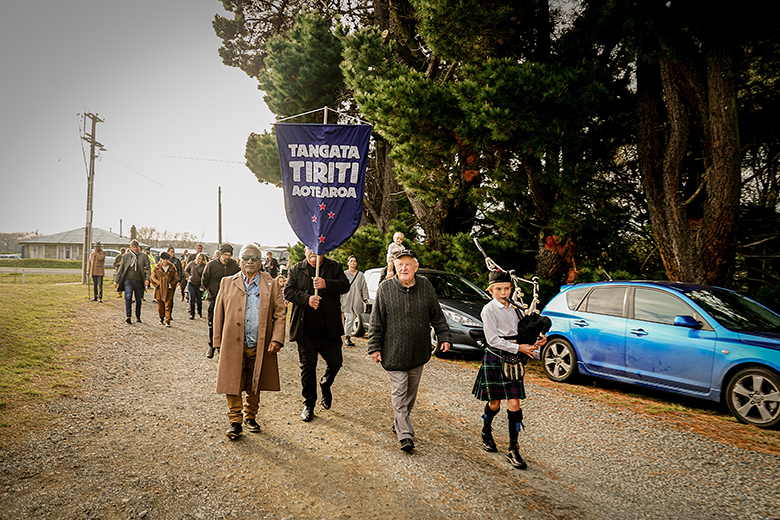[As published in Nov/Dec BayBuzz magazine.]
The die is cast. Well at least the votes are cast – the exact shape of the die is yet to emerge.
Recent tragic events in the Middle East and even the decision of our Australian neighbours to keep the voice of its first people suppressed, remind us that all human interaction and the politics that follow arise from context; the complete natural environment and the history of the peoples who live in that environment. As Hawke’s Bay is wine country, we might liken it to “terroir.’
Whilst I recognize that the 2023 Election has tested and stretched the weave of the social whariki, the metaphoric mat that binds us together as New Zealanders, my personal experience during cyclone Gabrielle convinces me that we are not likely to fly apart anytime soon. When pressed by crisis or calamity Kiwis come together and collaborate. As a nation we are kind and generous, and even though we may have our differences, we care for each other as neighbours and fellow citizens.
In the election the greatest tension to the woven strands that bind were around matters of race and perceived special entitlement.
The ACT Party has strong support across Hawke’s Bay, and almost 10% of the vote nationally, so let me focus on their policies as they present the most extreme points of tension. As I understand it, ACT wants to whip away the mat of connectivity in the form of ‘Te Tiriti’, the Treaty of Waitangi. As one ACT supporter, a friend, proposed to me, “the pendulum has swung too far”. His sense of the need for a fresh homeostasis is fueled by the sentiments expressed on ACT election hoardings, “Human Rights are universal, not based on race” and, “End division by race”.
At face value I agree with the sentiments entirely. But let’s come back to context and factor in the Te Tiriti/Treaty of Waitangi: the sacred agreement between the original inhabitants, the first owners of the land and its resources, and those of us whose relatively recent roots lie elsewhere but have come to Aotearoa to settle and benefit from the bounty of our beautiful, shared land.
Human rights are indeed universal – would it be that they were respected. Treaty-based rights, however, are akin to the property rights of the original landowners. This is something that the National Party has long recognized. The Labour Party struggles to reconcile the concept of Māori property rights with its philosophy of a meritocracy. That philosophical dilemma led to the debacle of foreshore and seabed legislation and the formation of Te Pati Māori.
Although ACT is notionally a Libertarian party it has little respect for the Te Tiriti/Treaty even though the Libertarian credo is that taking or using someone’s resource without their consent constitutes an initiation of aggression.

Ending division by race is something I have long struggled for. Let me personalize it.
I’m a white boy, a Pākehā descended from Irish stock who emigrated to Aotearoa in 1876. I married a full-blooded Māori woman and fairly purchased, from her uncle, land and a house at her turangawaewae at Waiohiki. We have six children, nineteen grandchildren, and ten great grandchildren.
What I experience is structural racism against Māori. Statistically, as compared to the descendants of my siblings, mine are going to earn less and die earlier. It doesn’t seem fair to me. I hear talk of Māori privilege but, for the life of me, and despite broad life experience, I simply don’t encounter it. I do encounter systemic deprivation, poorer housing, relatively poor health outcomes, and a criminal justice industrial complex that seems to show bias against my wife’s kith and kin, and consequently against our mutual descendants.
I see no privilege there. So, yes, I’m all for ending division by race.
On the marae I proudly describe myself as Ngāti Pākehā nō Aotearoa, Tangata Tiriti. I’m not ‘non-Māori’. I am someone with my own ancestry and I stand tall and confident in the belief that I belong in Aotearoa New Zealand because each day I do my best to uphold the agreement that binds us. ACTors (bad or otherwise) object to the terminology of Tangata Whenua and Tangata Tiriti, presenting them as an unwelcome binary divide foisted on us by the outgoing Labour government.
Fact check: the term Tangata Tiriti was first used by Sir Edward Taihakurei Durie, at Waitangi in 1989 when he was chair of the Waitangi Tribunal.
Ta Eddie said that Tangata Tiriti belong to this land by right of Te Tiriti o Waitangi/the Treaty of Waitangi. He noted that without the Te Tiriti/Treaty we would have no lawful presence in such numbers nor any legitimate political role in this part of the Pacific. Through Te Tiriti, Tangata Tiriti have a relationship with Māori and the land of Aotearoa New Zealand. Isn’t that beautiful? Indian, Asian, African, Arab, European, American (North and South), Melanesian and other Polynesian peoples, as Tangata Tiriti we all belong.
In the wake of the election, let me come back to that Hawke’s Bay terroir concept.
Our area’s experience of colonisation is unique. At the top end of Links Road near the expressway intersect are three carvings on tall pou. They represent a group of local chiefs referred to by local Māori as ‘the Trinity”. In 1849 these chiefs, Renata Kawepo, Paora Kaiwhata, Tareha Te Moananui and other local rangatira, by unanimous consent, through a letter to Governor George Grey invited European settlement of Ahuriri.
Despite the Māori aspirations of shared prosperity not being realized those Māori chiefs stayed loyal to their word. In the troubled times of the mid-1860’s when confronted by the complexities of what we now call “the New Zealand Wars” these East Coast Rangatira warned off other tribes from waging war against the Hawke’s Bay Pākehā settlers. Matters came to a head in October 1866 in what is now referred to as the ‘Battle of Ōmarunui’, barely a kilometer away from Waiohiki. Consistent with Te Tiriti/the Treaty the region’s Tangata Whenua and Tangata Tiriti stood side by side in defense of each other and their Tiriti agreement.
The underlying political sentiments of the East Coast chiefs of the day were summed up by my children’s tupuna Tareha Te Moananui in his maiden speech in the Third Session of New Zealand’s Fourth Parliament in September 1868. This was the seminal Parliamentary speech by a Māori.
I paraphrase, but even then, the issues are familiar. He argued that there should be one law for all New Zealanders. That’s equality. He said that Māori and European were similar but not the same. That’s a diversity statement. He proposed that the power of good was stronger than the power of evil. This is the fundamental precept of whānau ora. Oh, and he said that when problems arise let both Māori and other New Zealanders look at it and find a common solution – that’s co-governance.
An older Pākehā man said to me, perhaps expressing the misconstrued ACT proposition, “Why has it all changed?” He said, “I feel brittle!” Brittle. I understand that. That’s what many Māori have felt as they witnessed the place names of their ancestors being changed and their traditional food sources and economies being disrupted.
The word Māori simply means normal, ordinary, usual. There are differing world views. For Māori property rights intimate an obligation to care for the environment with an intergenerational lens, kaitiaki, not to exploit and crank out every drop of profit possible. As we grapple with climate change that seems to be a sound platform for a relationship.
For the moment the debate is over. I’d like to think that like after an event where perhaps hyper-aroused and intoxicated by ideas we say things that we later regret, we will take a more sober and conciliatory stance. Prime Minister-elect Christopher Luxon recently said that when Māori do well all New Zealanders do well. I agree with that. The Māori king, Tuheitia Potatau Te Wherowhero VII, echoing the words of Tareha, said policies that impact on Māori should be led by Māori for all New Zealanders.
We can get on together. Sir Keith Holyoake once reckoned that miscegenation holds the answer, that “the racial problems of Aotearoa New Zealand will be solved in the bedrooms of the nation”. Truly. Cuzzy!


Ka rawe Denis thank you for sharing this wealth of local knowledge, of which I had no idea. And for introducing me to the concept of Tangata Tiriti, which is probably the place of mana many otherwise labeled “colonials” and “immigrants” seem to seek or feel is being threatened.
Through this lens all peoples can stand tall.
I for one have grappled with “where does this leave me, is my ancestry wrong?”. Which is the wrong question, as you seem to infer. Being Tangata Tiriti and Tangata Whenua gives us all a place. Belonging.
I also note one other sentiment that has been floating around this – if Maori have Tino Rangatiratanga, and can ostensibly self-determine, then that’s great but how can the “rest of us” be allowed to get off the colonial/capitalist waka at the same time?! Can we jump ship?? ;-)
Thank you!